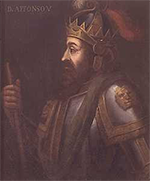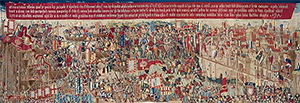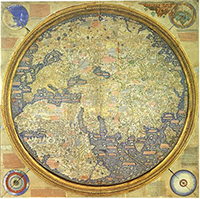King Afonso V of Portugal
Afonso V was King of Portugal for more than 40 years in the 15th Century. He expanded the borders of Portuguese-owned territory and continued his country's world-leading voyages in the Age of Exploration. 
He was born on Jan. 15, 1432, in Sintra. His father was Prince Edward, heir apparent to the reigning monarch, John I, and his mother was Eleanor of Aragon. Edward became king in 1433 and died five years later, leaving Afonso, as his oldest son, next in line to the throne. Edward had specified that his wife, Eleanor, be Afonso's regent until the boy came of age. Edward's brother Pedro had other ideas and made a bid for the regency himself. Pedro was eventually successful, sweetening the deal by, in 1447, giving his daughter Isabella to Afonso in marriage. Eleanor fled to Castile. Afonso and Isabella had three children, two of whom survived into adulthood: Joan (1452) and John (1455). Afonso came of age in 1448 and nullified all laws passed during his regency. He went further, declaring his uncle Pedro an outlaw. Pedro chose to fight this declaration, and the two men found allies enough to have a battle. At Alfarrobeira, Afonso prevailed. Pedro died in the battle. 
The young ruler became a warrior king, taking an army across the Strait of Gibraltar and taking the fight to the Moors, resulting in the seizure of Alcacer Cegeur, Tangier, and Arzila. The result was Portuguese sovereignty over much of North Africa and earned the king the appellation Afonso the African. 
The king supported the efforts of another uncle, Henry the Navigator, who sponsored voyages that pushed the boundaries of Portuguese influence ever southward along Africa's western coast. In 1457, Afonso commissioned the production of a world map known as the Fra Mauro Map. He sent it to Henry in 1459. When Henry died, in 1460, Afonso took over the support of such expeditions. Afonso's wife, Isabella, had died in 1455. He married again in 1475, to Juana of Castile, the only child of that kingdom's monarch, Henry IV. When he died, Afonso claimed the Castilian throne on behalf of his wife. Afonso pressed his claim by leading an invading army into Castile itself. He found defeat at the Battle of Toro in 1476, at the hands of Ferdinand II of Aragon, whose wife was Isabella of Castile. Afonso returned across his own border and did not stray again. Juana refused to carry on as queen and entered a convent. In 1477, Afonso announced that he was giving up his throne, abandoned any further claim to the Castilian throne, and entered a monastery. However, the Cortes did not meet in order to accept his abdication, so he was technically still king. Eventually replacing him on the Portuguese throne would be his son, John II. (Afonso had no children with his second wife.) Afonso V, still in the monastery, died, on Aug. 28, 1481.
|
|
Social Studies for Kids
copyright 2002–2026
David White




